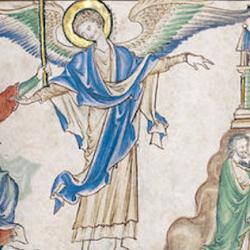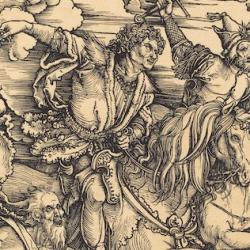The oath of the strong angel in Revelation 10 knits together two passages.
The angel’s oath stance – hand raised – alludes back to Ezekiel 20, where Yahweh reminds Israel of the day He chose them and lifted His hand (Heb. ‘esse’ yadi), making Himself known to them as Yahweh their God (v. 5). In raising His hand before Israel, He committed Himself to “bring them out of the land of Egypt into a land that I had selected for them, flowing with milk and honey” (v. 6).
The oath in Ezekiel 2o echoes earlier promises concerning exodus and inheritance (e.g., Genesis 24:7; Exodus 13:5, 11; Deuteronomy 1:8; the verb in each case is shaba’), which sometimes use the same terminology of “lifting the hand” (e.g., Exodus 6:8). When Yahweh swears an oath in the Old Testament, it is usually in connection with exodus and conquest.
The content of the angel’s oath echoes the fourth commandment in Exodus 20. There Yahweh commands Sabbath-observance as a commemoration of His creation of heaven, earth, sea – the same three zones that the angel mentions in his oath. In Exodus 20:11, we find the phrase “and all that are in them” covering all three zones; that phrase is repeated for each of the three zones in the angel’s oath: “heaven and the things in it, and the earth and the things in it, and the sea and the things in it” (Revelation 10:6).
Ezekiel 20 and Exodus 20 are dealing with related concerns. The oath remembered in Ezekiel 20 promises deliverance from slavery and the gift of a good land, that is, a promise that restless Israel will be brought to Sabbath in the land. The oath of Ezekiel 20 is, translated, Yahweh’s commitment to give His people rest, commemorated by the Sabbath command of Exodus 20 (cf. the allusion to the exodus in the fourth commandment in Deuteronomy 5).
From all this, we may conclude that the angel’s oath has something to do with exodus, conquest, and Sabbath. His specific oath is a promise that “there shall be delay no longer” and that in the days of the seventh trumpet, the “mystery of God is finished” (Revelation 10:6-7). Whatever the mystery of God, the echoes of Ezekiel and Exodus suggest that it involves deliverance, inheritance, and rest. The fact that the angel hands John a book that tastes like the land – like honey – is a light reinforcement of the connection.
That could all be explicated at some length, but a few quick conclusions: First, the unveiling of the mystery of God is linked in Revelation to the saints’ inheritance of the new creation (Revelation 21-22). The completion that the angel promises is that completion. Second, the force of the angel’s oath is that this completion will occur soon, without delay. Sometime shortly after John wrote Revelation, something that can be called the “finishing of the mystery of God” occurred, something that has to do with deliverance from slavery, inheritance, and rest. For John, the arrival of the new creation is not something either past or in the distance future, but in the near future.














